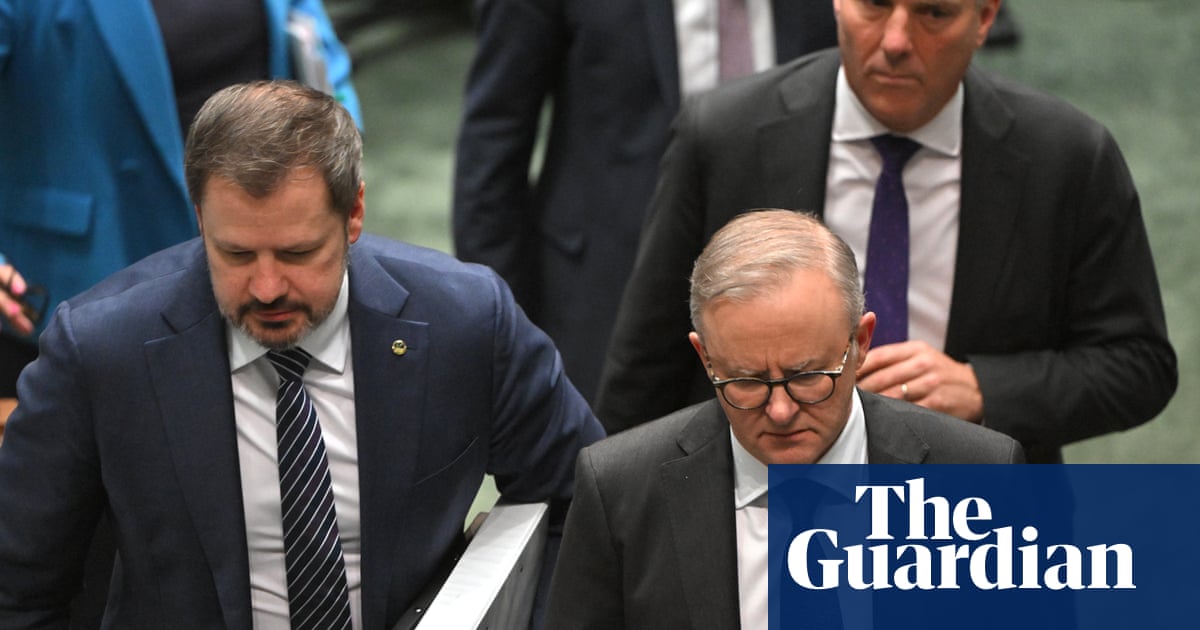Ed Husic has blamed Richard Marles for his shockousting from the cabinetthis week, accusing the deputy prime minister of being a “factional assassin”.
Husic on Sunday said he believed his speaking out on issues like Gaza was a “factor” in his departure, and said the prime ministershould have intervened.
“The difficult issue here is that we’ve had barefaced ambition and a deputy prime minister [who] wields a factional club to reshape the ministry,” he told the ABC’s Insiders.
“I think people when they look at a deputy prime minister, they expect to see a statesman, not a factional assassin.”
Husic, in his first public comments since the new ministerial group was decided, said he had volunteered to leave the frontbench.
Underfactional agreementswithin the Labor party, the New South Wales right faction, which Husic sits in, needed to make way for a member of the left faction.
The other three senior men from the NSW right are Tony Burke, Jason Clare and Chris Bowen.
Husic said he didn’t want the choice to be made through a national ballot.
“I made the decision. Ultimately we would have had to have taken it to a national right ballot. The way it was managed was all very last minute,” he said.
“I did not want to put my colleagues through a national ballot. Again, I did it in the interests of stability.”
Sign up for Guardian Australia’s breaking news email
Husic saidAnthony Albanesecalled him on Saturday, two days after the decision was formally announced on Thursday.
Asked repeatedly by host David Speers whether the prime minister had thanked Husic for his service, Husic only said there was a “very brief” discussion.
He said Albanese should have intervened to save him.
“I’m not going to sit here with false modesty. Of course, when you hear him [Albanese] rattle off names of … people that would be retaining ministerial spots, I’m sure I wasn’t the only minister wanting to be in that list,” he said.
“If he [Albanese] had exercised that authority, I don’t think anyone would have quibbled.”
Mark Dreyfus, who was also dumped from the Albanese cabinet in favour of the younger Victorian right faction MP Sam Rae, reportedly made phone calls to Marles and factional allies to try to secure his position.The prime minister also didn’t intervene to save his position.
Husic was the first Muslim to sit in the cabinet, and the first to be sworn in with a Qur’an.
He has beenoutspoken on the war in Gazaand was the first government member to accuse Israel of “collective punishment”.
“You can’t celebrate diversity and then expect it to sit in the corner silent. You need to speak up, when you bring the different views to either a cabinet table or a caucus,” he said.
“I certainly tried to help us navigate wretchedly difficult issues, such as Gaza, post the horrors of October 7.”
Outside the ministry, Husic is likely to feel freer to express his views on the conflict and Labor policy related to it.
“We’ve seen just in the past week or so the Israeli parliament say it wants to annex Gaza and effectively that is a form of ethnic cleansing,” he said on Insiders.
“We’ve seen the starvation of its people through the failure to provide humanitarian assistance.
“It [the Netanyahu government] should be held to account. Starvation is a war crime.”
Husic said he would remain in theLabor partyand hoped to return to the frontbench.
“I have a contribution to make, I want to keep making it,” he said.
